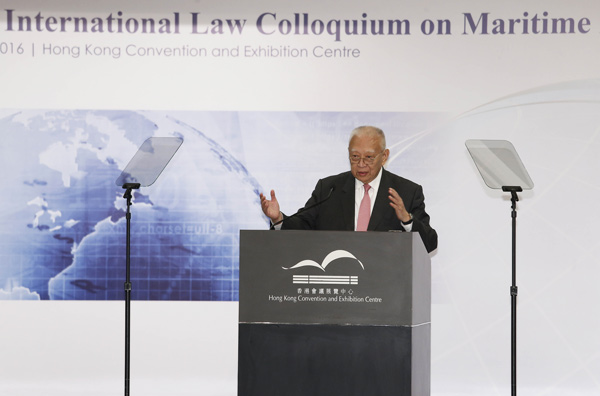China has ample evidence to reject 'ruling' on South China Sea dispute: Tung Chee-hwa
(Xinhua) Updated: 2016-07-17 09:47
 |
|
Tung Chee-hwa, vice-chairman of the National Committee of the Chinese People's Political Consultative Conference and former Chief Executive of Hong Kong SAR, addresses a keynote speech at the Public International Law Colloquium on Maritime Disputes Settlement at the Hong Kong Convention and Exhibition Center in Hong Kong, on July, 15 2016. [Photo by Roy Liu/China Daily] |
HONG KONG - Tung Chee-hwa, vice-chairman of Chinese People's Political Consultative Conference, said on Friday that there is ample evidence for China to reject the "award" rendered on July 12 in the South China Sea arbitration established at the unilateral request of the Philippine government.
Delivering a keynote speech at the Public International Law Colloquium on Maritime Disputes Settlement, Tung said China has indeed adhered to international legal norms in the South China Sea dispute.
The United Nations Convention on the Law of the Sea (UNCLOS) has provided its signatories with an option to make an exception in cases concerning maritime boundary delimitation, with more than 30 countries have taken the option including UN Security Council permanent members Britain, France and Russia, Tung said.
On this basis, Tung said, China ratified the Convention in 1996, when it made a declaration reaffirming its sovereignty over all its archipelagos and islands, including those in the South China Sea.
In 2006, China made another declaration, under Article 298 of the Convention, that any maritime boundary delimitation issues are excluded from the jurisdiction of any dispute resolution mechanism under the Convention.
Another reason for China declined to attend the arbitration proceedings is that, in 2002, a Declaration on the Conduct of Parties in the South China Sea was agreed, promoting bilateral negotiation among the disputing nations over sovereignty issues, and calling for the freedom of navigation in the South China Sea for all nations of the world in accordance to UNCLOS.
"To have attended the arbitration proceedings at the Hague would undermine a process that has long been in place to resolve the dispute in a bilateral and peaceful manner," Tung said.
Furthermore, UNCLOS rules clearly provide that, until the bilateral discussions have been exhausted, a country should not approach the Permanent Court of Arbitration to adjudicate border disputes, Tung added.
Tung also talked about the historical evidence to support China's sovereignty over the South China Sea, saying the Chinese discovered Nansha Islands with the earliest archaeological evidence of their use dating back hundreds and sometimes thousands of years.
In more recent history towards the end of the World War II, there emerges ample, clear and convincing evidence that China has sovereignty over the Nansha Islands.
This evidence has been recognized by the international community, including the United States. These can be found in very important international treaties and declarations including the Cairo Declaration and Potsdam Declaration, he said.
"Whilst a strategic intend is to pursue peace above all, China will firmly and steadfastly pursue the protection of her territorial integrity," Tung said, emphasizing peace is precious and stands above all and China would like to resolve territorial disputes peacefully.
Tung also criticized the US for frequently carrying out military exercises in the South China Sea, sometimes in conjunction with the military of another claimant to the disputed region, which helps to consolidate suspicions of many Chinese people that the US pivot to Asia is to contain China.
He said the best way to demonstrate this is for the US to persuade the Philippine government to positively engage with the Chinese government on resolving the territorial dispute.
"It is well recognized that the China-US relationship today is the most important bilateral relationship in the world. Economically, the relationship is becoming more and more interdependent in terms of trade and investment," he said.







